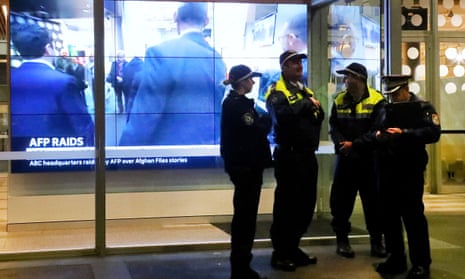News organisations have been slow to respond to the tide of legislation that progressively and surely threatens their ability to report the affairs of state.
Indeed, some media outlets have a history of cheering on the rampant growth of national security laws, as though the mantra of government was more important than their ability to unearth the truth.
There was an eerie sense of a police state when images emerged of the Australian federal police entering the ABC in Sydney and demanding access to the corporation’s files on sensitive news reports. Only days earlier the police had been rifling through the Canberra home of News Corp journalist Annika Smethurst. It prompted a heightened concern about the cankered state in which the “free press” finds itself.
Calls for a special independent inquiry into how security laws impinge on a free press were headed off by the government to the parliamentary joint committee on intelligence and security. The reporting date is 17 October. The inquiry could well overlap with work under way by the Senate environment and communications references committee looking into “the adequacy of commonwealth laws and frameworks covering the disclosure and reporting of sensitive and classified information”.
The most significant laws that have an adverse impact on journalism and how it functions can be divided into those that block access to information; those that criminalise dealing with and publishing information about the state; and those that enable the state to track and monitor the work of journalists.
What we find is a maze of enactments, dizzying in their complexity and uncertainty. The definition of national security is unsettled, the defences few and in most instances worthless, while the penalties for transgression are severe.
To better understand the enormity of what is at stake it is important to drill into these laws and identify the pitfalls facing a “free press”, which in an ideal world is supposed to be as vital a component of a liberal democracy as parliamentary elections, an independent judiciary and a professional public service.
Stuff that is off limits to the media
Where, in a criminal or civil trial, issues arise relating to national security information, the National Security information (Criminal And Civil Proceedings) Act 2004 asks the courts to go into cloak and dagger mode.
The government can address the court about how it should deal with any national security information before it. This hearing itself must be in camera and, after the parties are heard, the court may make an order to hear the case in closed session and it only need publish its reasons to the parties and the attorney general.
Witnesses can be compelled to silence or excluded from proceedings and evidence suppressed.
Reporting these cases is an impossibility. All offences under the act carry two-year jail terms.
We’re seeing an example of this suppression and secrecy playing out now in the commonwealth’s case against Bernard Collaery, a Canberra lawyer accused of leaking information about the Australian’s government clandestine and illegal bugging of the Timor-Leste ministerial offices.
The government wants Collaery’s trial held behind closed doors on grounds of “national security”.
The Asio Act also makes it illegal to disclose information about secret Asio business, or “special intelligence operations” (SIOs). This extends to Asio engaging in illegal activities or intimidation.
It is not always clear to a journalist whether Asio has classified an operation as “special”, so reporting on something without knowing its ramifications poses a high risk. To make things ever riskier, defendants are required to disprove their guilt.
Much of the national security regime illustrates a pleonastic overkill, whereby the same offences are punishable under separate pieces of legislation.
An offence under the “special intelligence operation” provision of the Asio Act might just as conceivably be an offence under the more recent provisions of the criminal code dealing with “secret information”.
The prosecutors might be able to have two bites of the cherry for reporters who delve into the affairs of the secret intelligence organisation.
Danger zones for reporters
In the middle of last year the criminal code part 5.6 created new crimes for government insiders, eg whistleblowers, who reveal things the regime regards as secret. It also criminalises journalists, who publish things insiders have told them.
The legislative enterprise was to clamp down hard on leaking from inside the tent to those outside.
It is a direct assault on public interest journalism, which is heavily dependant on secret sources for stories about the manner in which political power is exercised or abused.
There is a broad palette of information that potentially attracts criminal sanctions. Penalties range from two to seven years’ imprisonment for basic offences, or up to 10 years for aggravated offences.
We have seen stories suppressed on application by the government where court cases involve foreign political leaders. The Securency bribery case was one such, where reporting had earlier been subject to a super injunction because the government wanted to prevent diplomatic embarrassment.
Journalists and others, such as human rights organisations and bloggers, can fall foul of provisions that apply where information is obtained from a commonwealth employee or former employee.
Only classified or top secret information is relevant in these circumstances, or information which, if communicated, would endanger Australian security, harm public health and safety, or interfere with preventing, investigating or prosecuting a federal crime.
The penalty for publishing is five years and two years for “dealing” with secret information.
Even for journalists to receive a letter containing classified information, without the contents being known before the envelope is opened, may be sufficient to form the basis of a case against the news gatherers.
There’s a defence for those engaged in the business of news media who believed publishing or dealing with the information was in the public interest. A judge’s view of what is in the public interest is often at variance with those media defendants.
The defence applies not just to journalists, but to editorial support staff working under their direction. It does not, however, apply to whistleblowers, and apparently not to independent citizen journalists or others, such as human rights activists, who are not in the “business” of news.
There are other, narrower defences, like prior publication, or reporting maladministration to a relevant investigatory body.
Espionage
In Australia, you can be a spy by strict liability. And you can get up to 20 years’ jail for your troubles.
That’s the effect of amendments to the criminal code in relation to espionage passed in June last year. They were introduced by the attorney general, Christian Porter, as part of a suite of espionage-busting, foreign-influence fighting, national security-fetishising reforms.

The new laws criminalise making information available to “foreign principals”, meaning foreign governments, political parties, terrorist groups and international organisations.
The offences range over information related to national security – or indeed any information or classified information – that has been dealt with so that it ends up in the hands of a “foreign principal” and harms Australia’s security. The penalties range from life in prison to 20 years.
For journalists there are dangers lurking not far from the surface. The United Nations, or an agency of the United Nations, or Al Jazeera, which is controlled by a foreign power, could all conceivably be in receipt of information from a journalist as part of the process of research and gathering news.
As we have seen in the cases of Witness K and Collaery, a broad view is taken by prosecutors as to what constitutes harm to Australia’s security. A finding of guilt is not dependant on national security actually being harmed and the potential offender does not need to have a specific foreign principal in mind.
The only defence for a media defendant is prior publication – that someone else had already published the information and that there was a reasonable belief that republication would not harm Australian security. Slim pickings indeed.
Snooping on journalists
There are a number of quite recent measures that enhance the power of the state to monitor the work of journalists and media organisations – the metadata provisions and the anti-encryption provisions among them.
Under the Telecommunications (Interception and Access) Amendment Act 2015, a Brandis-era enactment from 2015, telcos are required to hang on to citizens’ metadata for two years after its creation.
Security agencies, including the AFP, Asio and state police, can access this data for law enforcement purposes. The list of accessing agencies is long and disturbing.
The fourth estate gets a fig leaf’s worth of protection: where the object of accessing journalists’ metadata is to identify sources the enforcement agency must apply for a special warrant.
Asio can read anyone’s metadata, so long as it is relevant to the agency’s functions, while other security organisations can do so for three reasons: to enforce the criminal law, to locate missing persons, or to enforce a law with a pecuniary penalty.
There’s plenty of journalism that would be covered by those categories – stories about missing children; corporate fraud; abuses in the provision of human services, such as health and education; political and/or administrative mismanagement; corruption; and domestic violence – in fact, all the important stories and a large proportion of the content of the daily media.
The warrants are warrants in name only and the alleged protection for journalists and their sources is non-existent with the process routinely abused.
The Commonwealth Ombudsman recently revealed that a journalist’s data had been illegally obtained in Western Australia and in the ACT it emerged that between March 11 and October 2015 the ACT police unlawfully accessed citizens’ metadata 3,365 times.
Citizen journalists, casual commentators and human rights organisations are not afforded the screen of these faux-warrants.
Once issued, warrants remain secret and disclosing their existence is a crime punishable with two years’ jail. Applications can be heard by a range of officials, depending on the situation: federal magistrates, administrative appeals tribunal members, even the attorney general himself. The relevant authority must be satisfied the warrant is in the “public interest”.
Recently, it was revealed that 78% of interception warrants under other provisions in the TIA Act were signed off, not by judges, but by members of the AAT, the most rampantly stacked federal quasi-judicial body.
In a flurry of pre-election fear-mongering, parliament late last year also passed the Telecommunications and Other Legislation Amendment (Assistance and Access) Act, another range of measures that directly assaults the journalistic process, which frequently uses encrypted communications to protect sources.
The legislation requires telcos to help Australian security agencies hack into users’ encrypted data. It also extended covert search warrants under a string of commonwealth acts, whereby the constabulary can lawfully snoop on blissfully unaware subjects.
The AFP, Asio, the ASD and state police can either request or force telcos to hack their customers. The laws only apply where the relevant agencies are investigating a crime punishable by three or more years’ jail, ie an enormous number of crimes.
The installation of malware on to suspects’ devices, or removing encryption, is also a possible byproduct of the legislation.
Police can apply for a “covert computer access” warrant. If granted, this warrant never has to be served, and agencies can hack a computer without anyone knowing.
This legislation has the potential to take the state deeper into the newsrooms of the nation, to vet or thwart journalism.
Finally …
We could go on with other recent developments. For instance, the Criminal Code Amendment (Sharing of Abhorrent Violent Material) Act, 2019, applies if media organisations “host” on their websites “violent, abhorrent material”.
In practice this could include audio or images of terrorist attacks, although journalists may have a rather vague “public interest” defence. If the defence fails, the penalties are steep: for natural persons it’s three years’ prison or $2.1m, or both, and, for a corporation, it’s a fine of $10.5m or 10% of turnover, whichever is greater. Turnover includes global takings.
The legislation joins the ranks of those measures whose effect is to chill journalists and their sources.
There is a vast and untidy array of laws to enforce state secrecy and security. They hang over the heads of news rooms with uncertainty as to whether a particular law applies, what limited defences are available and whether toothbrushes should be at the ready.
In the process of creating a hyperventilating regime of secrecy and security, the state has put a hobnailed boot on the throat of journalism. News publishers find it less risky, and maybe more profitable, if stories about abuse of power are shunted in favour of how to cook a mushroom omelette.

